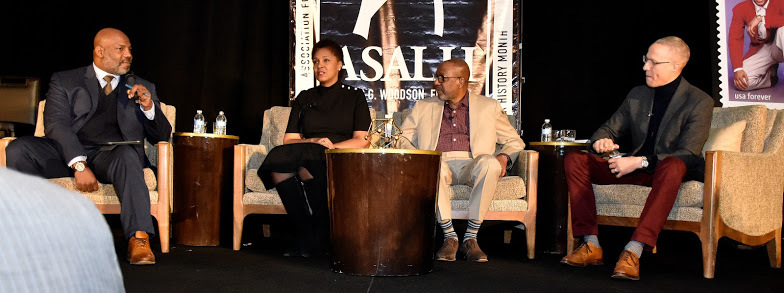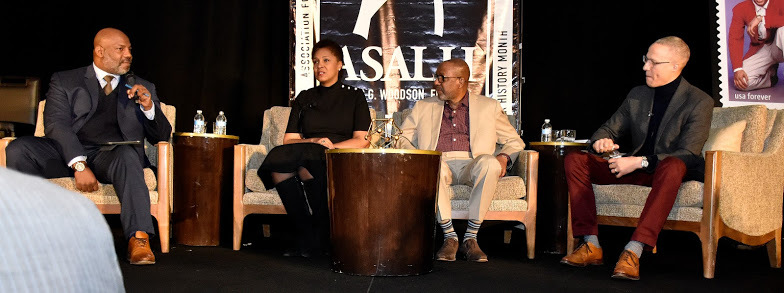[ad_1]
By Micha Green, AFRO Washington, D.C. Editor, [email protected]
With distinguished guests, a booming book fair and strong conversations to boot, African American excellence was in full effect at the 93rd annual Black History Luncheon hosted by the Association for Studying African American Life and History (ASALH) held at the Washington Renaissance Hotel in Northwest, D.C. on Feb. 16.
Founded by well-regarded historian, journalist, and author Carter G. Woodson, ASALH is the organization that founded Black History Month (which was originally Black History Week) and is responsible for choosing the national theme for the celebration during February. This year’s theme and ASALH luncheon theme was “Black Migrations.”

Prior to the luncheon experience, attendees were treated to the annual Featured Authors Event from 10 a.m. to noon. Special guest authors included Minyon Moore, Leah Daughtry, and Yolanda Caraway, who co-authored alongside Donna Brazille with help from Veronica Chambers “For Colored Girls Who Have Considered Politics.” Also present was Dorothy Butler Gilliam, the first Black journalist for {The Washington Post}, who discussed her new book, “Trailblazer: A Pioneering Journalist’s Fight to Make the Media Look More Like America.”
At noon guests were ushered into the ballroom for an afternoon of entertainment, excellence, serious discussions and a large lunch.
High-energy WUSA 9 anchor Darren Haynes served as the master of ceremonies for the afternoon, which included a greeting from ASALH president Dr. Evelyn Brooks Higginbotham; an in-depth occasion speech on this year’s Black History month theme “Black Migrations,” by Dr. Tiffany M. Gill from University of Delaware; an invocation and grace that prayed for healing of today’s society by the Rev. William H. Lamar IV of Metropolitan AME Church in Washington, D.C.; an introduction of the Black heritage stamp featuring Gregory Hines and a panel of Black intelligentsia.
As has been the tradition since 1978, the U.S. Postal Service Black History Month Heritage stamp was showcased at the luncheon, this year featuring famous tap dancer and actor Gregory Hines.
“[Hines] His particular style of performance combined with his other talents, helped usher in a new appreciation for the dance. His mentorship of the next generation, including Savion Glover, will hopefully ensure that he endures. There would be no Savion Glover without Gregory Hines,” said Dr. Tamara L. Brown, associate professor of History at Bowie State University told the audience.
With about 1,000 guests happily dining on a three-course meal, the luncheon continued with a fiery panel discussion featuring esteemed panelists breaking down the historicity of Black Migrations and its connection to current society. The panelists included Dr. Gloria J. Browne-Marshall, professor of Constitutional Law at John Jay College of Criminal Justice; Dr. G. Derek Musgrove, associate professor of History at University of Maryland Baltimore County; and Kojo Nnamdi, host of “The Kojo Nnamdi Show” and “The Politics Hour” on WAMU 88.5. Dr. Jelani Cobb, the celebrated Ira A. Lipman professor of journalism at Columbia University, moderated the discussion, using pointed questions about Black Migrations and the need for movement in order to find opportunities and success in African American history.
“Each time we reinvented ourselves successfully, the laws would change to undermine our progress,” Browne-Marshall explained to the audience to a round of applause.
“We have to look at the triggers for reinvention. Why do we migrate north? Why did we have to do these things? Because there were lynch mobs; because there was an undermining of the Black economy; because there were rapes and assaults,” she said. “So when we talk about the Black migration, we also need to talk about the triggering events that gave rise to the Black Migrations… that’s going on right now among different regions of the country… seeking opportunities because all we’ve ever wanted to be is a human being. Respected as a human being, work as a human being, have rights as a human being… achieving that through migration.”
After the panel, there was a special presentation by Omega Psi Phi Fraternity and Omega Life Membership, closing remarks from AASALH Executive Director Sylvia Cyrus and a benediction from the Rev. Alfonso L. Campbell III from Zion Baptist Church in Washington, D.C.
[ad_2]
Source link

